
In March 2023, Governor Ron DeSantis signed the Florida Statute 768.0706 (HB 837) into law. This law offers a presumption against negligence for multifamily property owners who comply with specified security requirements, Crime Prevention Through Environmental Design (CPTED) assessments, and employee crime deterrence training.
According to Florida Statute 768.0706(2), “The owner or principal operator of a multifamily residential property that substantially implements the following security measures is presumed not liable for criminal acts occurring on the premises if committed by third parties who are not employees or agents of the owner or operator.”
To qualify for protection, CPTED assessments must be conducted by a certified Florida CPTED Practitioner or law enforcement agency.
This guide by Triple C Security Consulting is designed to help property owners and management companies understand the compliance and benefits to becoming compliant with Florida Statute 768.0706 HB837 compliance and navigate compliance requirements to safeguard residents and investments.
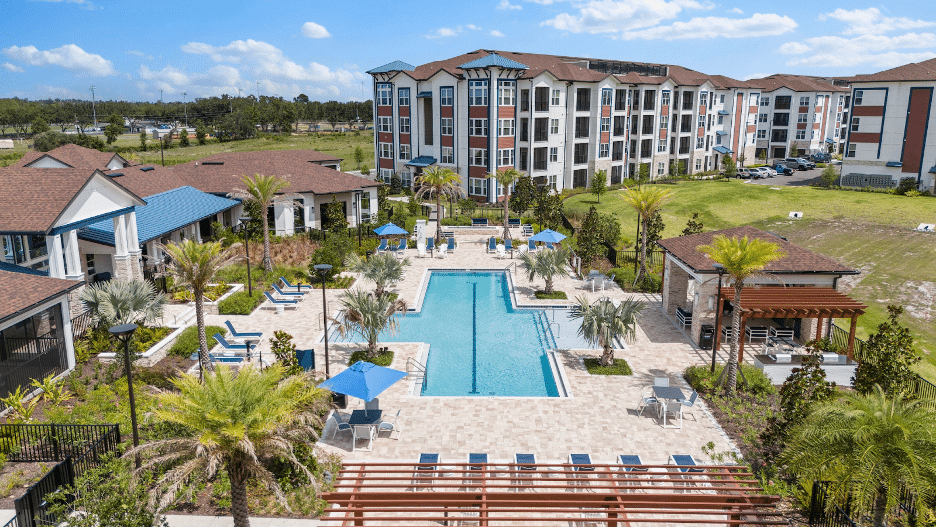
The Requirements of Florida Statute 768.0706 HB837
The Florida Statute 768.0706 requirements are summarized as follows:
A.
- A security camera system at entry and exit points that records and stores video footage for at least 30 days to aid in identifying and apprehending offenders.
- A parking lot lit to an average intensity of 1.8 foot-candles per square foot at 18 inches above the surface or controlled by a device to ensure lighting from dusk to dawn.
- Walkways and common areas illuminated or device-controlled from dusk to dawn.
- At least a 1-inch deadbolt in each dwelling unit door.
- A locking device on each window, exterior sliding door, and other non-community doors.
- Locked gates with key or fob access along pool fence areas.
- A peephole or door viewer on each dwelling unit door without a window.
B.
The property must undergo a CPTED assessment by a certified Florida CPTED practitioner or law enforcement agency and maintain “substantial compliance.” This requirement was due January 1, 2025.
C.
By January 1, 2025, all employees must have completed crime deterrence and safety training covering the seven required topics in Subsection A. New hires must complete the training within 60 days of employment.
Benefits of Complying With Florida Statute 768.0706 (HB837)
The main benefits of becoming compliant with the statute are:
- Legal Protection: Property owners are shielded from liability for crimes committed by third parties, reducing the risk of costly lawsuits.
- Lower Insurance Costs: Compliance can lead to reduced insurance premiums due to improved security and liability protections.
- Increased Property Value: Enhanced security measures and predictable legal outcomes make properties more attractive to buyers and renters.
- Improved Resident Safety and Retention: A well-secured environment fosters tenant satisfaction, contributing to long-term occupancy and property stability.
Costs of Compliance With Florida Statute 768.0706
Property owners should budget $7,000 to $10,000 for a qualified security consultant, such as Triple C, to conduct the CPTED assessment required under the law. Costs vary based on property size, number of structures, and parking areas.
Beyond the initial assessment, additional expenses are required to achieve “substantial compliance” with § 768.0706(2)(a) and CPTED recommendations. Lighting and security cameras are among the most significant costs, with upgrades ranging from $2,000 to $50,000, depending on coverage and installation complexity.
While compliance requires investment, it mitigates the financial risk of multi-million-dollar liability lawsuits. Many property owners are unaware of the long-term compliance and benefits to becoming compliant, which include legal protections, reduced liability, and increased property value.
Navigating Compliance With Florida Statute 768.0706
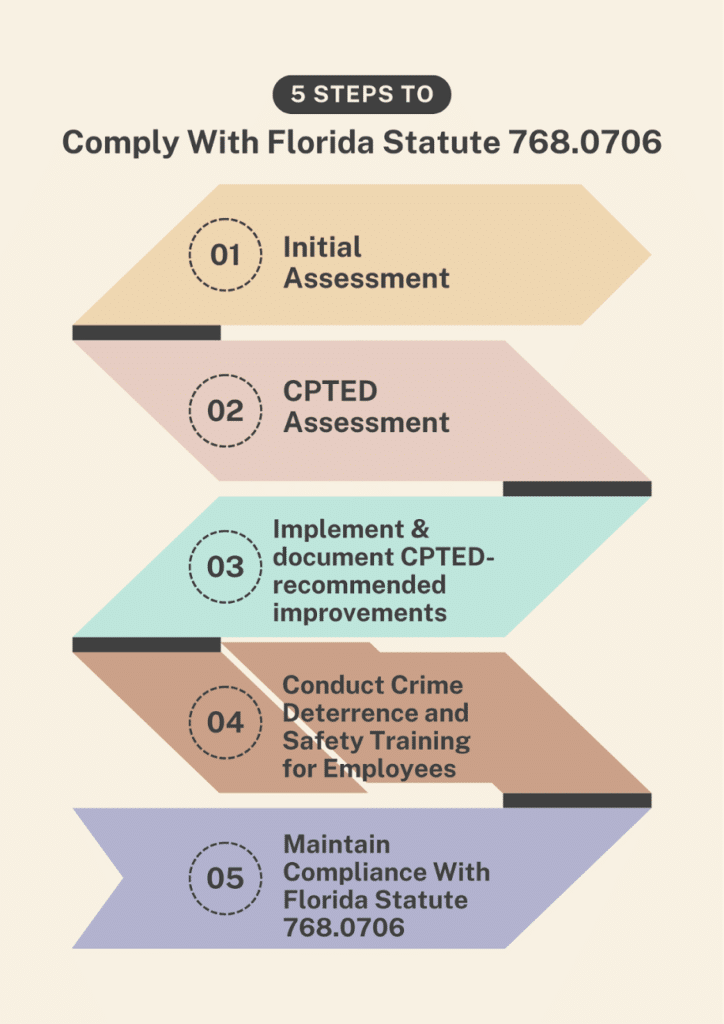
Step 1: Initial Assessment – Conducted by Property Owners or Managers
The first step in complying with Florida Statute 768.0706(2)(a) is for property owners or managers to conduct an internal security assessment. This review evaluates whether the property meets the statute’s requirements and identifies deficiencies that need correction before formal compliance verification.
Key areas of assessment are parking lot and walkway lighting, access control systems, security camera coverage, and window and door locking mechanisms. Addressing vulnerabilities early ensures a more efficient transition to the next phase.
Step 2: CPTED Assessment – Conducted by a Certified Florida CPTED Practitioner
After completing the preliminary internal assessment, property owners must engage a Florida CPTED Practitioner (FCP) to conduct a Crime Prevention Through Environmental Design (CPTED) assessment. The CPTED assessment provides an expert evaluation of security conditions and ensures the property meets statutory security requirements.
Upon completion, the FCP provides a detailed report outlining findings and recommended corrective measures. The report serves as a guideline for implementing necessary security improvements.
The following outlines the essential steps for investigation and implementation.
Door-Lock Inspection
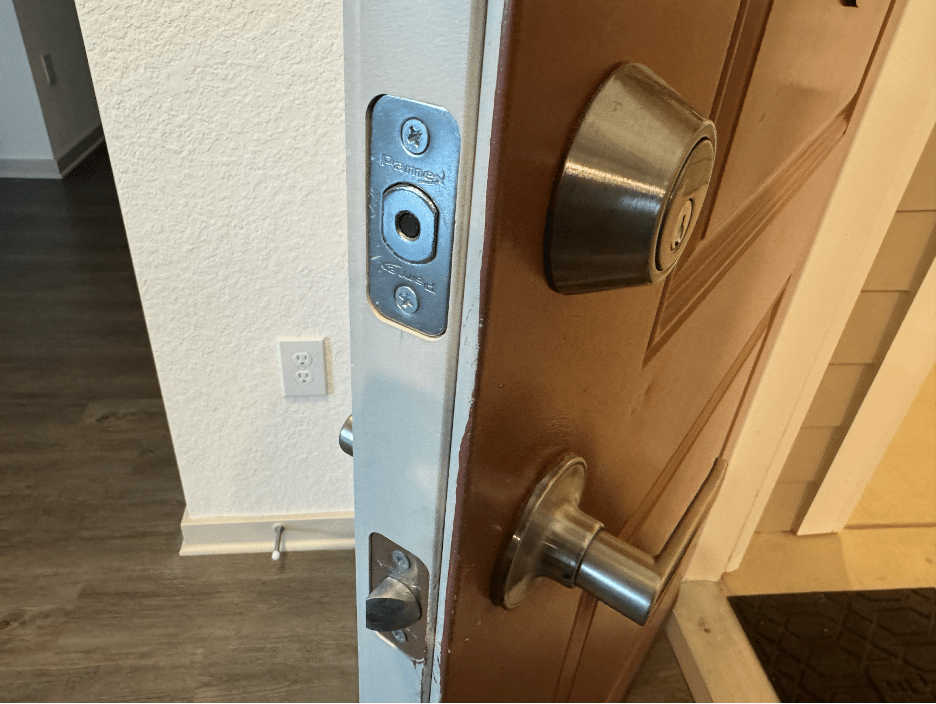
Carry out a detailed inspection of residential units to verify compliance with Florida Statute 768.0706(2)(a)(4). Use precise measurement tools to confirm that all door deadbolts meet the required 1-inch length. While many properties maintain consistent locking hardware, older properties sometimes have non-uniform replacements due to past maintenance. If inconsistencies are identified, a comprehensive inspection and fixing are required to ensure all locks meet compliance standards.
Door Peep-Hole Inspection

Conduct a thorough inspection of residential unit doors without windows to verify compliance with Florida Statute 768.0706(2)(a)(7). Ensure all doors are equipped with a standardized peephole or door viewer across all units. Visually inspect each peephole for clarity and unobstructed visibility. While most units have peepholes, they may be blocked by dirt or paint buildup. If obstructions are found, coordinate with maintenance to clean all peepholes, ensuring full functionality and compliance with statutory requirements.
Window and Sliding Door Lock Inspection

Execute a comprehensive inspection of all residential unit windows, sliding glass doors, and patio doors to ensure compliance with Florida Statute 768.0706(2)(a)(5). Verify that all locking devices are functional and standardized across units. Confirm that hardware is consistent, and inspect locks for proper alignment and operation. If malfunctions or misalignments are identified, coordinate with maintenance to repair or replace faulty locking devices, ensuring full compliance with statutory requirements.
Pool Fence and Access Inspection
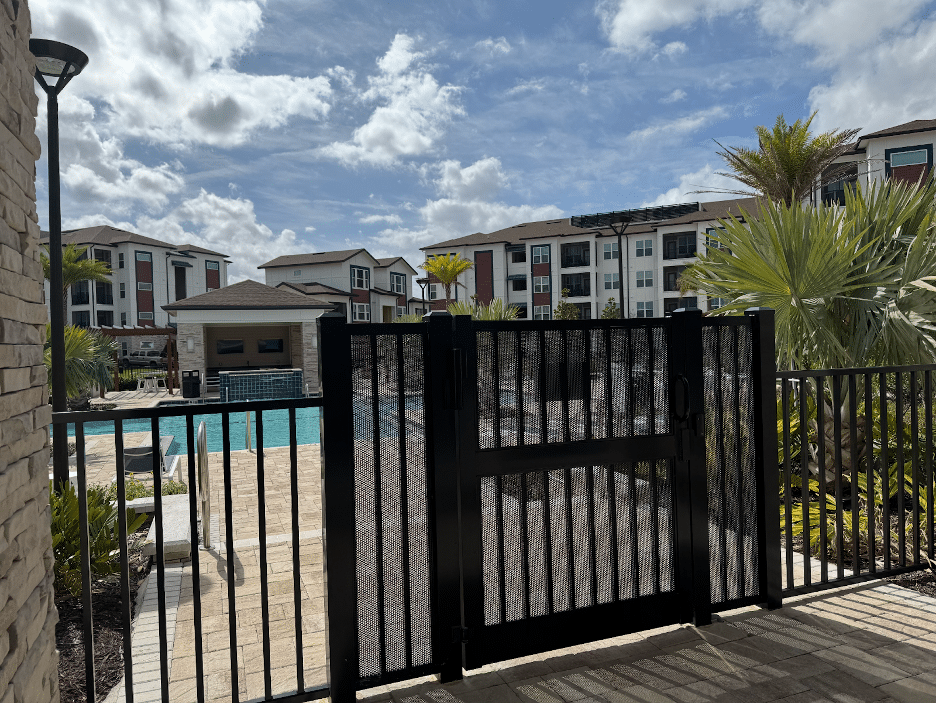
Inspect the pool area fencing and gates to ensure that the pool remains locked at all times and is accessible only to residents using resident-issued keys, fobs, or key cards in compliance with Florida Statute 768.0706(2)(a)(7). The primary concern is ensuring the pool area is never left unsecured. If some gates use access control for residents while others are mechanically locked for maintenance, the setup is likely compliant. If unsecured access points are found, coordinate with maintenance to implement corrective measures immediately.
Common Area Lighting Inspection

Inspect laundry rooms, fitness rooms, community restrooms, and other indoor common areas to ensure compliance with Florida Statute 768.0706(2)(a)(3). The areas should be illuminated at night using a photocell, timer, or secured switch inaccessible to residents. Unsecured switches or motion-sensor lights are typically non-compliant as occupants can turn them off and they only come on when the area is occupied. Address any deficiencies to ensure continuous illumination and compliance with statutory requirements.
CCTV Camera Coverage and Compliance
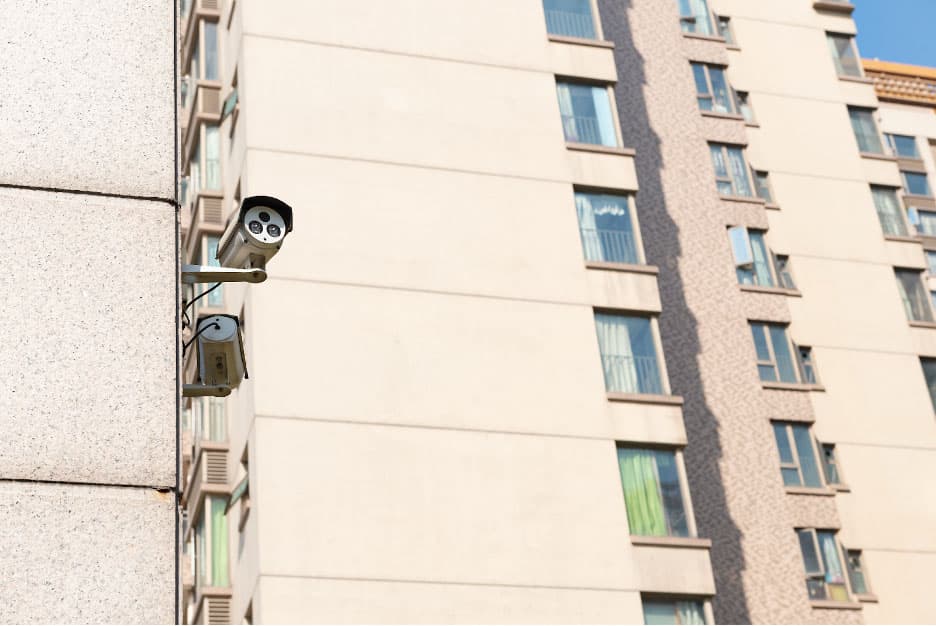
Evaluate the CCTV system to ensure compliance with Florida Statute 768.0706(2)(a)(1). Confirm that security cameras cover all entry and exit points with clear imaging for offender identification. Assess camera performance, particularly under low-light conditions, to identify glare or contrast issues. Also, review stored footage to verify that recordings are retrievable for at least 30 days. If retention is based on storage limits, maintaining at least 45 days of footage is recommended to accommodate future system expansions.
Parking Lot and Walkway Illumination Compliance
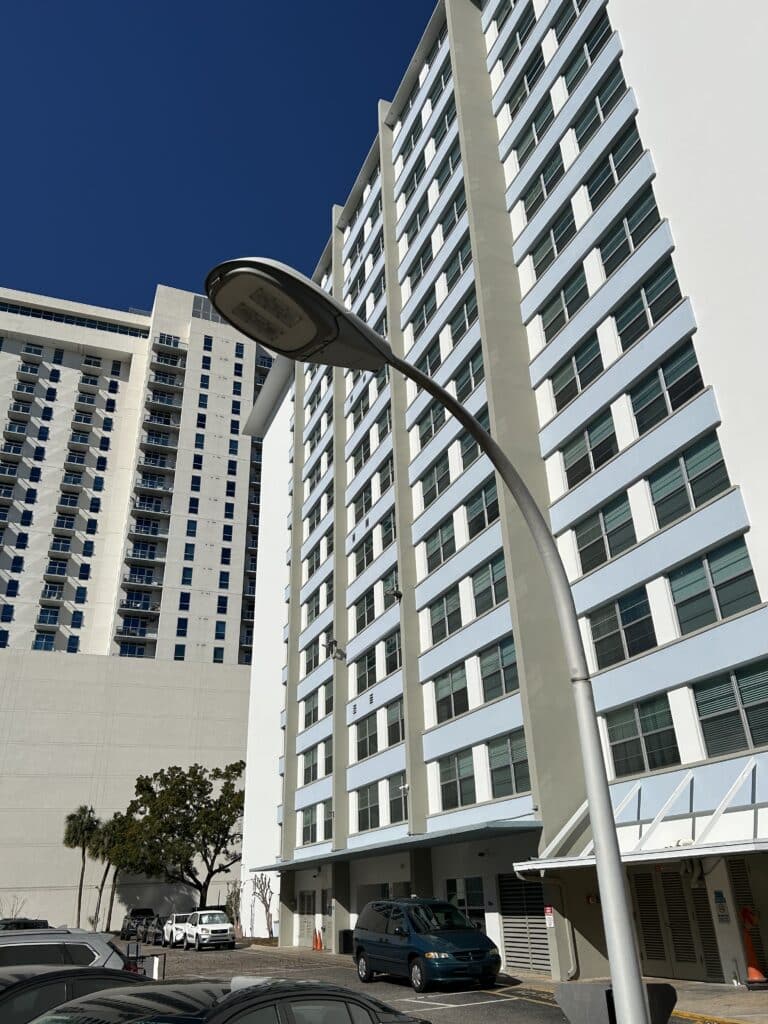

Verify that parking lots and walkways meet the illumination requirements of Florida Statute 768.0706(2)(a)(2)-(3). Parking lots must maintain an average of 1.8 foot-candles per square foot at 18 inches above the surface from dusk until dawn, measured using a NIST-calibrated light meter. Walkways and common areas must also remain illuminated from dusk until dawn.
Step 3: Implement and Document Recommended Security Improvements
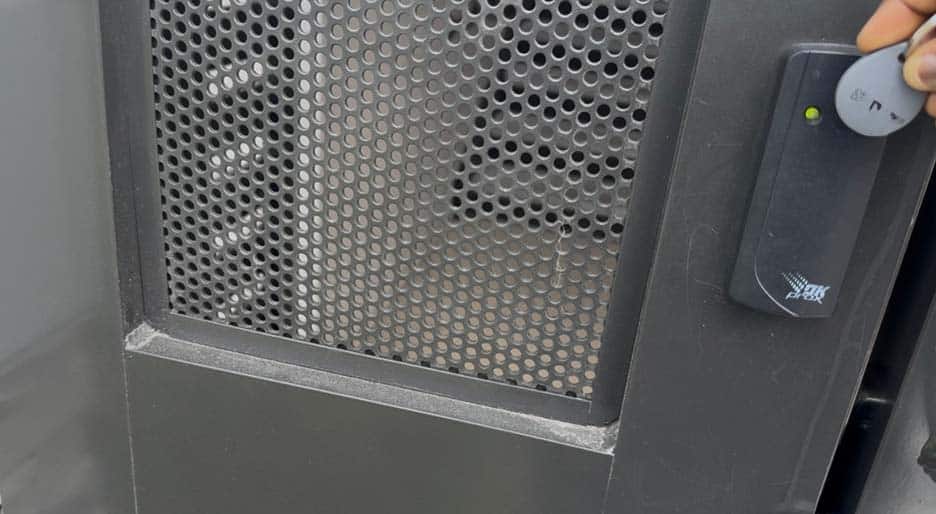
Following the assessment, property owners and management companies must implement necessary corrective measures for compliance with CPTED recommendations and the requirements of Florida Statute 768.0706(2)(a). Therefore, coordinate with the property maintenance manager to conduct necessary improvements. Also, maintain detailed records of all security improvements as proper documentation provides critical evidence in case of legal challenges.
Best Practices for a Smooth Implementation Process
- Engage Stakeholders: Keep employees, residents, and relevant parties informed about planned security improvements, their implementation timeline, and potential impacts on property operations and safety.
- Monitor Implementation: Continuously track and evaluate the implementation of security improvements to ensure alignment with Florida State 768.0706.
Step 4: Conduct Crime Deterrence and Safety Training for Employees
All property employees must complete holistic crime deterrence and safety training, following the Florida Crime Prevention Training Institute’s curriculum. Employees hired after January 2025 should complete this training within 60 days to ensure continued compliance with Florida Statute 768.0706.
Step 5: Maintain Compliance With Florida Statute 768.0706
Compliance with Florida Statute 768.0706 is an ongoing process that requires continuous efforts, including upkeeping physical security measures, training new employees per Section 768.0706(2)(c), and ensuring the CPTED assessment is updated at least every three years.
Key Considerations for Selecting a CPTED Consultant
For reliable CPTED assessments, evaluate these factors before hiring a security company.
- Certification and Legal Expertise: Select a certified Florida CPTED Practitioner with experience in premises liability cases or expert witness testimony to defend findings in legal proceedings.
- Quality Report and Documentation: Review sample CPTED reports. Reports should be well-structured, professionally formatted, and clearly articulated with proper grammar and logical organization. It must include appendices or citations to CPTED standards and authoritative sources to enhance credibility and minimize legal risks.
- Use of Accurate Measurement Tools: Ensure the light meter used for illumination testing is NIST-certified and calibrated to maintain accuracy and legal credibility.
- Professionalism: Your consultant should recognize significant structural changes and acknowledge limitations without setting unrealistic expectations.
- Prioritization of “Substantial Compliance”: They should focus on critical, cost-effective improvements and provide a defensible compliance strategy without implying all recommendations are mandatory.
Florida Statute 768.0706 Compliance: Protecting Properties, Reducing Liability, and Enhancing Security
Navigating compliance with Florida Statute 768.0706 (HB 837) is critical for multifamily property owners seeking legal protection, enhanced security, and improved property value. By implementing CPTED assessment recommendations, security upgrades, and employee training, property managers can reduce liability risks, lower insurance costs, and foster a safer living environment for residents.
However, compliance is not a one-time task; it requires ongoing maintenance, documentation, and periodic reassessments to ensure security measures remain effective and up to standard. Partnering with a certified Florida CPTED Practitioner, such as Triple C Consulting, streamlines the compliance process and ensures a seamless implementation of security measures.
